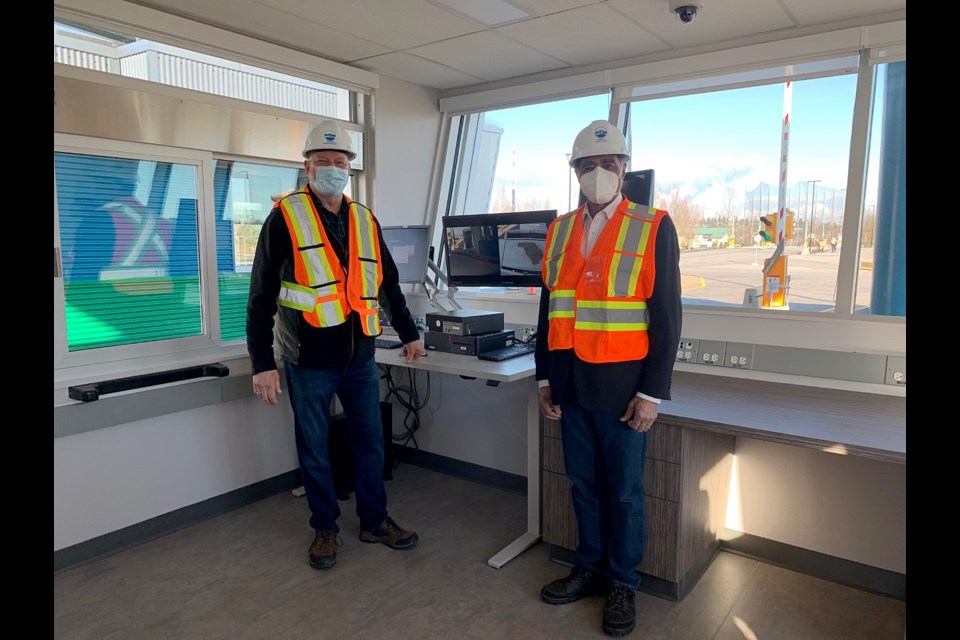How do you cover an old landfill site?
For Metro Vancouver, the regional agency used the bottom ash from its Waste to Energy plant in Burnaby to top the decontaminated grounds in Coquitlam.
A total of 70,000 tons of the non-combustible material was used as aggregate to layer its site on United Boulevard for the new transfer centre, a $77.6 million facility — funded through tipping fees — that officially opens on Monday (March 14) for residents and businesses to drop off their waste and recycling.
Located a kilometre west of the existing transfer station, also on United Boulevard, the new building is 2.5 times larger and is being touted as the most advanced in North America.
“It’s a one-stop shop,” Metro Vancouver CAO Jerry Dobrovolny told the Tri-City News last Friday during an exclusive tour with board chair Sav Dhaliwal, a Burnaby city councillor, and Jack Froese, the mayor of Langley Township and the chair of Metro’s Zero Waste Committee.
“We expect to see up to 700 vehicles a day coming through here to drop off garbage and recycling. It will serve our region well.”
About 40 staff will work at the new transfer site — with 35 employees moving from the old centre. That building sits on land leased by the Beedie Group, which is proposing to redevelop the area for a waterfront community paying tribute to the Fraser Mills sawmill heritage.
The existing transfer station is about three to five years past its life cycle and will shutter on Saturday night (March 12).
“Everyone is very pleased to be moving over,” said Paul Henderson, Metro’s general manager of solid waste services.
Located on 15.5 acres, the new facility is on land owned by the regional district and is therefore exempt from city property taxes.
In fact, Henderson said, the new site is so big that residential and commercial vehicles can be separated on site to head to the scales or recycling depot. At the current station, vehicles often spilled out onto United Boulevard to queue up to drop unwanted goods.
It will be open every day except Christmas and New Year’s Day from 5:30 a.m. to 6 p.m. and “anybody in the region can use it,” Henderson said.
HOW TO ENTER
On the east side, there’s a free recycling depot — including a Return-It Express — to deposit items such as glass, used motor oil, batteries, CO and smoke detectors, light bulbs and used cooking oil.
In the middle are the scales for small vehicles, as well as commercial and municipal vehicles, with state-of-the-art recognition technology for quick processing.
And, to the west, is the transfer building, a 60,000 sq. ft. flat space (about double the current building size) that’s closed up to prevent birds from entering.
As well, vents are on the roof to control dust and odours.
There, visitors will drop off their trash on the transfer station floor with loaders pushing the bags into a chute on the floor, which connects with the compactors below.
Henderson said he expects to see about 30 truckloads of compressed material shipped out daily to processors. “It’s a much, much better facility than what we have now down the street,” he said. “And there is a lot of room for us to grow.”
DIVERSION RATE
Still, while Metro Vancouver builds new transfer stations around the region — including in Central Surrey, where a smaller facility is due to open this year at 6711 154 St. — it also struggles with diversion rates.
The agency hopes to divert 80 per cent of the region’s solid waste out of landfills; however, the current rate is 64 per cent (Coquitlam’s diversion rate stands at 71 per cent, city staff say).
“We’ve got the highest rates in North America but we’ve been stuck for a few years,” Dobrovolny acknowledged. “As of last month, we’ve got milk containers refundable and we’re allowing mattresses for a $15 charge, but we need to keep being more innovative. The issue is that we’ve got a global economy and the packaging keeps piling up. We want to promote goods that are locally made to cut the waste.”
Another challenge for Metro Vancouver is the trash in multi-family buildings, many of which don’t have separated garbage and recycling bins, Dobrovolny said.
“Most people want to do the right thing, but they may be on the lazy side so it isn’t done,” he said. “That’s why this facility is so important."
"It’s all here," he said.




